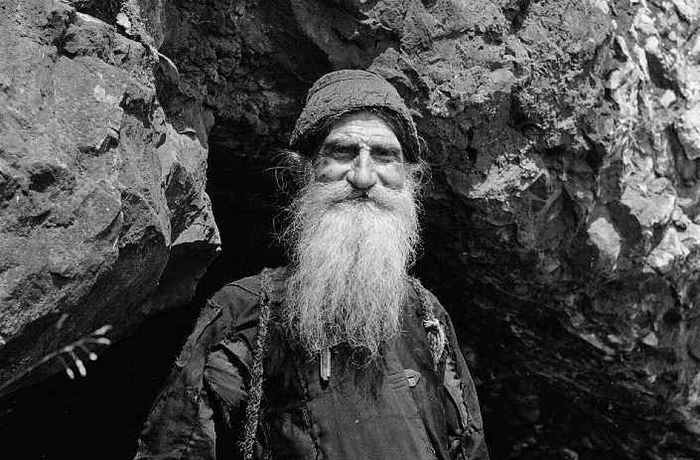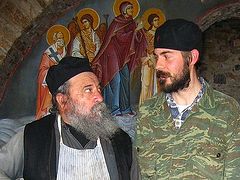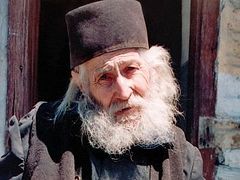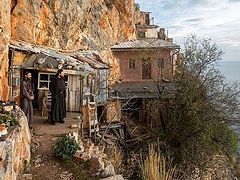Elder Daniel of Katounakia talks about Elder Philaret, the great hermit of the rocky Karoulia region.
Shoes as a means of humility
I read the following in the “Lavsaik” of Palladius about the life of St. Horus: “At first, living in the desert, he ate herbs and sweet roots, drank water when he was able to find it, and spent all his time in prayer and chanting”. I think this is a fully suitable description of the ascetic life of Fr. Philaret. He, as one of the fragrant flowers growing on the rocks of Karoulia, was a true friend of virtue.
He always walked barefoot; and once, our elder, Fr. Gerontius, desiring to test whether his love and simplicity were from God and not egotism, said to him:
“Fr. Philaret…”
“Bless, geronda!”
“You’re a hypocrite! You walk around barefoot in an old ryasa, putting your humility on display!”
“Geronda,” answered Fr. Philaret, humbly lowering his gaze, “yes, I’m a hypocrite! What do I have to do to rid myself of this infirmity?”
“Starting from today, walk around in shoes!”
“Alright, geronda. May it be blessed!”
Having bowed low before him, Fr. Philaret left. He found an old pair of shoes somewhere, and, carrying them in his arms, returned to his hesychasterion. He put them on before entering. It was exceedingly painful. After so many years of walking barefoot, his feet, accustomed to freedom, simply could not bear to be fit into a pair of shoes. But obedience and humility, as you know, work miracles! The presence of virtue becomes evident when your fellow brother controls you, and you humbly submit. Such behavior is a scorching flame for the devil!
“All is well now! Now you’re a real humble monk,” said geronda.
“May it be blessed, geronda, may it be blessed!” answered Fr. Philaret.
Having made a prostration, he went on his way, stumbling and walking gingerly, like a little child…
Next to the hesychasterion grew a large number of wild herbs. Fr. Philaret would pick the ones that were edible and, bringing them to us, would say: “Eat, fathers. This is from God. These herbs should be eaten by those who labor for the Lord’s sake rather than by a slacker like me!”
“I can’t swear!”
Once a man wearing a ryasa came to him and called himself a deacon. Seeing the elder’s old books, he set his eye on them and, before leaving, took them in secret. He didn’t know that at Daphne, before leaving the Holy Mountain, there was a customs inspection checking all the things you were departing with. He got arrested there!
“Where’d you get these books from?” they asked him.
“I got them from… Fr. Philaret at Karoulia, he sold them to me!” lied the deacon in order to justify himself, and continued slandering: “He’s illegally selling ancient books!”
The police arrived at the hesychasterion and carried out an investigation. Having believed the miscreant deacon, they filed a case against Fr. Philaret, a holy ascetic. Soon a subpoena came. Most of the fathers don’t know what that is; such worldly procedures are unknown to them. We explained what this meant to him, and he said, “But how do I get there? Please take me there.”
We did everything that was necessary. We found some clothes that were a bit newer, because his ryasa was just too old and worn out. We also asked an attorney we were acquainted with to go to court with Fr. Philaret in order to help him, and gathered some money so that father could get to Thessaloniki and stand trial—he whom even the Lord, in our humble opinion, will not condemn “in that day” (Mt. 7:22). He was a heavenly man, a fragrant flower of the desert!
Fr. Philaret said, “I’ll obey the government and go so they can judge me.” And then he went off for Thessaloniki. He hadn’t left the Holy Mountain for a whole 58 years! For 58 years he lived in Karoulia, living off of the wild herbs and water that were given by God there. A blessed man, who had attained a high degree of virtue, was now in court as a defendant. I don’t know how things work there. I've never crossed the doorstep of that institution. I only remember what the elder himself told us. He was summoned by the chairman of the court:
“Monk Philaret?”
“Yes, it is I, the unworthy one,” replied Philaret humbly, bowing his head.
“Why did you sell those books?”
“I didn’t sell them! A certain brother came to me and took them in order to read them. He would have returned them later. That’s what I thought…”
“Father, you have to give a sworn testimony in order to be believed. That’s the order of the court procedure”.
“I can’t! In the Gospel it says: Swear not at all (Mt. 5:34).”
“But you have to swear, father.”
“How is that done?”
“You have to put your hand on the Gospel.”
Then, Fr. Philaret did three full prostrations and reverently kissed the Gospel…
“Is that enough?”
“No, father; you have to place your hand on the Gospel and say: ‘I swear, etc.’”
“I can’t swear!”
“But if you don’t swear, then you’ll go to prison for nine months!”
“And a thousand times do I agree to go to prison! I await eternal judgment from the Lord for my sins! Am I to be concerned over some nine months in prison?!”
The pseudo-deacon was also present in court. Dressed in an expensive ryasa, he held himself in an important and haughty manner. The attorney he hired told a whole bunch of lies. In particular he said: “Is it possible, Mr. Judge, that this wonderful clergyman would steal books from such a ragamuffin?”
In the end, slander and concealment of the truth inclined the judge to the side of the dazzling thief, and the monk-ascetic, appearing before them in an old cassock, unskilled in the art of lying, who had never uttered an oath before, was found guilty. The verdict was pronounced and the police took Fr. Philaret to prison.
The judges didn’t care what would happen to the monk, but the ordinary folk did. They collected the necessary amount of money to pay bail and have the elder released from prison. Fr. Philaret with his usual simplicity, having thanked everyone, went back on his way to Karoulia—the place of his many years of solitude. He thanked us, who had given him all the help we could, too. “Thank you, fathers,” he told us. “Pray that the Lord may also deliver me from eternal prison!”
By the way, he was also very pleased with our attorney, who had defended him in court. This holy hermit always thought kindly of everyone. He told us enthusiastically:
“The Spirit of God abides in that attorney! He described everything exactly the way it happened!”
“Geronda,” I told him, “that’s simply his job!”
“No,” insisted the elder, “he has the Spirit of God!”
I asked him:
“Geronda, you’ve lived away from the world for 58 years. What was it like to be there now?”
A good person, as we have already said, sees only good in everything. He answered: “What can I say, fathers? All the people out there, in the world, are very good. They’re all running around, to and fro, for the sake of their salvation; all of them but me, a lazy sinner, sitting around in these rocky cliffs and not doing any work, not fulfilling the will of God!”
Having said that, he retired to his cell, glorifying God for sending him such a trial towards the end of his life for the salvation of his soul.
A blessed repose
Once, when he was a very old man, he invited me and Fr. Akaky to his cell and with joy said:
“May you be well, my children. It’s good that you came, because I won’t be seeing you again! I’m leaving tonight… But before that happens, I’d like you to console me.”
“How, geronda?”
“Read the Psalter for me; something calming for the soul.”
We read a number of different psalms, and tears of joy ran down geronda’s cheeks, and the whole time he kept making the sign of the cross. After we finished, he said:
“And I’d like to ask of you one last thing: chant for me the hymn of the Theotokos, ‘It is truly meet’. But let’s do it while standing up, like we do when we sing the national anthem of our homeland!”
He got up with difficulty. He was very exhausted and his skin had become almost transparent in color. After we finished, the elder, with tears of joy in his eyes, hugging and kissing us, said: “My children, I’m seeing you here for the last time! Forgive me, forgive me!”
Everyone cried. Fr. Philaret was calming us down. We left deeply moved. In the morning we were informed that he had passed away! Just as he had predicted…
We buried him among the rocks in a befitting and worthy manner. In layman’s words, I’ll put it this way: a star of monastic asceticism went out on the sky of Mt. Athos, but left behind it a bright trail, showing us how to struggle and remain consistent in ascetical labor. May his memory be eternal! Pray for me, father!
It often happens that towards the end of our lives the All-Holy God sends us some kind of trial that makes us better, and those around us also benefit from it. So it was with Fr. Philaret, who labored with humility and was rewarded by God. You have heard, Mr. Melinos, how the devil attempted to perturb a man of virtue and ascetic labor; but the All-Holy God protected him with His grace, and the soul of the ascetic received no harm, but was strengthened in its love for the Lord. This love became more and more inflamed, and with increasing zeal the elder praised God.




